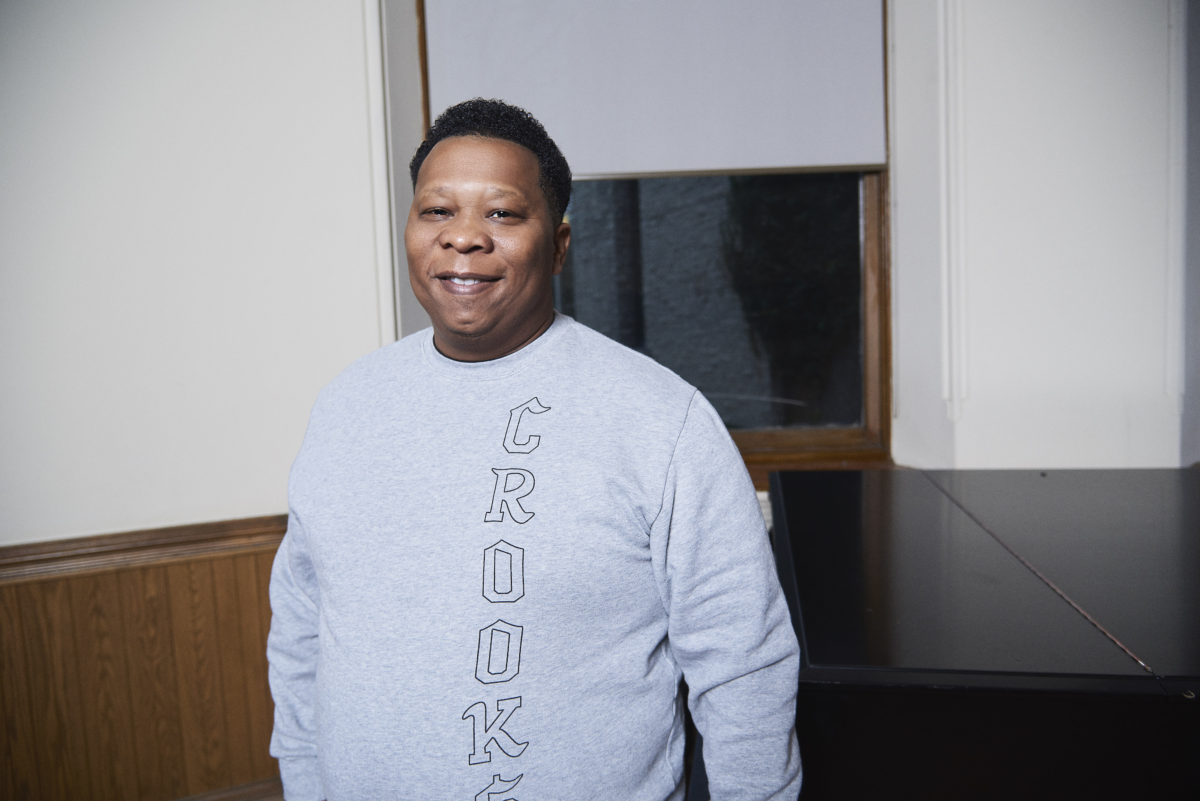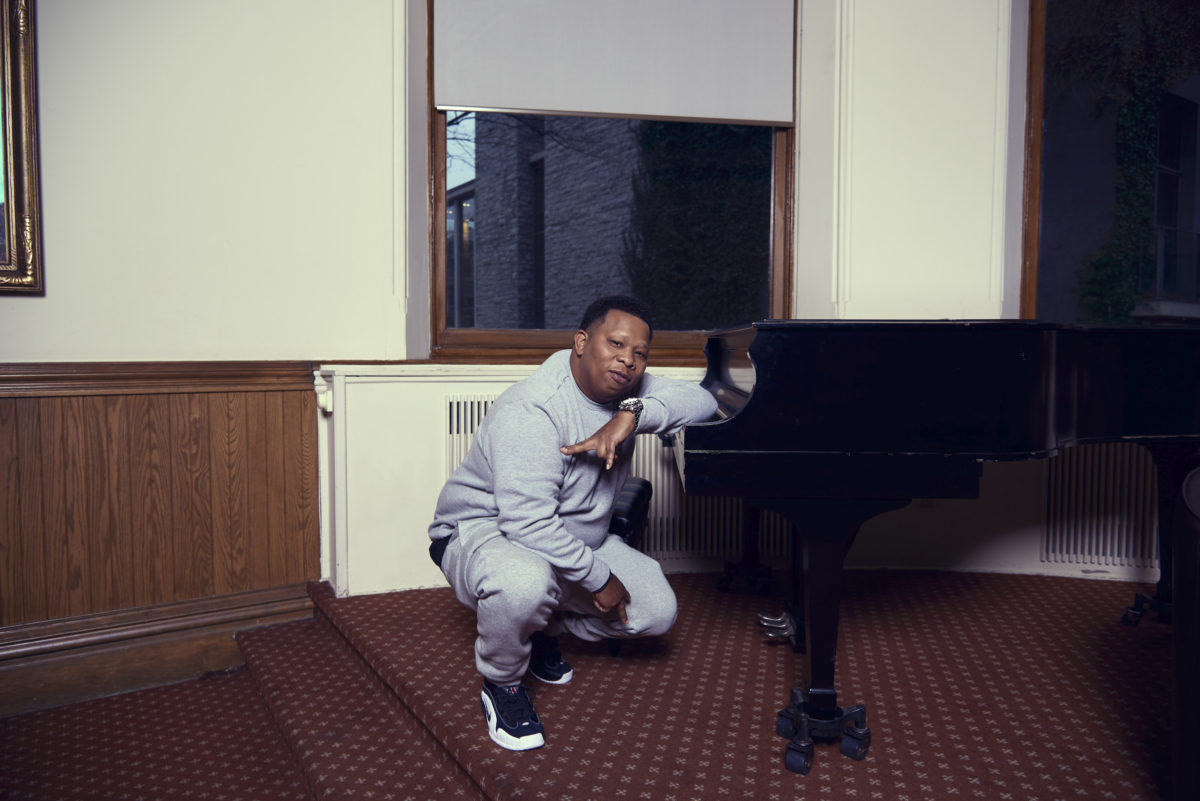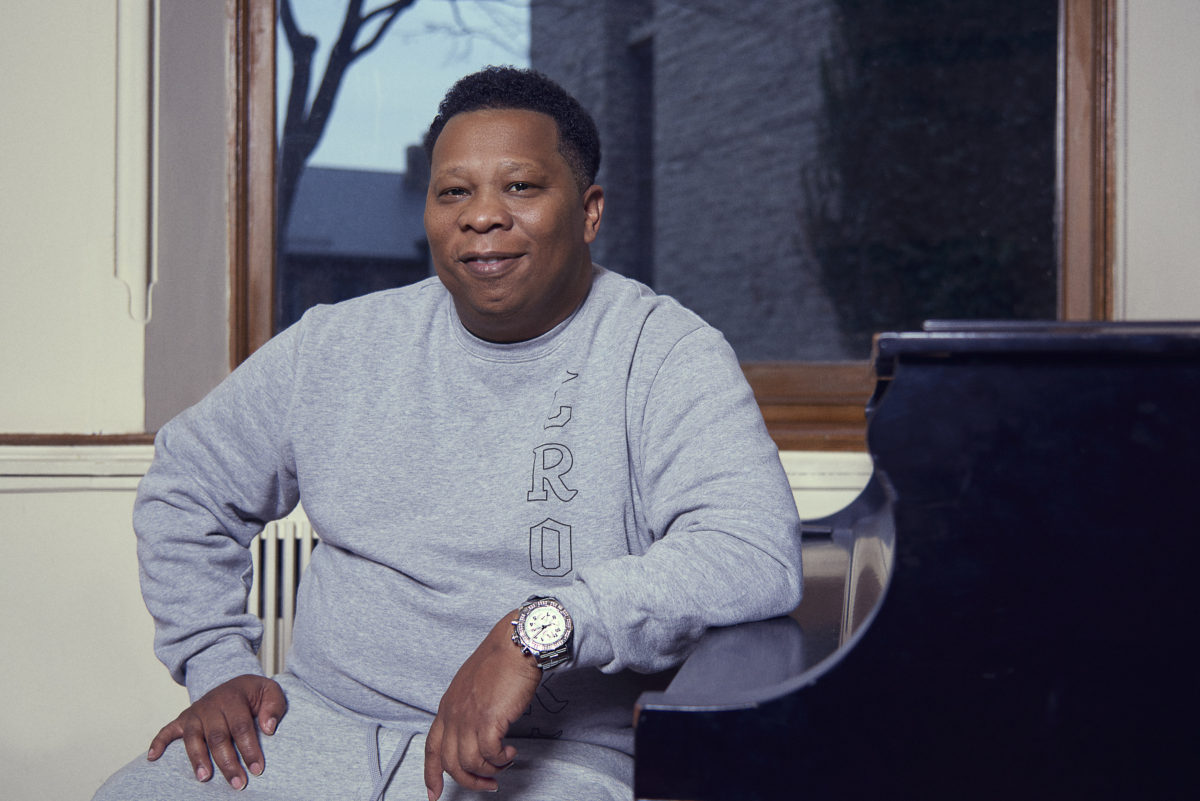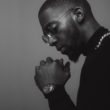As Mannie Fresh tells it, music is in his DNA. “In my house there was music 24/7.”
His dad was a DJ and played instruments. When asked how it influenced his choice to get into music he says simply: “That’s pretty much 100 per cent of why I do music.”
The multi-faceted producer, artist and DJ hailing from New Orleans, who gained widespread popularity for his work with Cash Money Records, is inside a room at the University of Toronto’s Victoria College getting ready to do a keynote address with aspiring and established music creatives and professionals at the Battle of the Beat Makers 2018.
He sits down with Urbanology Magazine to talk being a risk taker, the rise of the Insta-celebrity and why Cash Money Records was both a gift and a curse for hip-hop.
What advice would you give to somebody who’s trying to break into the industry today?
Don’t be afraid to push the envelope, try some new things. You know a lot of people think that they got to ride the wave of what’s going on. Sometimes your biggest song might be just the song that’s completely different from what’s going on. So I would say don’t be afraid to take bits and pieces from different stuff, from jazz, from R&B, from classical music, don’t just put yourself in one box. Right now, trap music is hot and you know that when the first thing producers give me is trap music and I’m just like I don’t need to hear no more trap music. So don’t put yourself in one box, try out a bunch of things. You never know you could be an upcoming R&B producer and you didn’t even know it. Just get into the different genres of music and different styles. I think that’s it and keep pushing … you’ve gotta find what’s your niche and where you fit in in the world.
Every artist should make one song that’s life changing even if the world don’t get it.
You’ve said that you wish today’s rappers would go against the grain and take more risks. Who are the rappers that you would classify as risk takers and why?
I would say Kendrick Lamar is a risk taker because you know just his subjects on what he raps about. On the first album where he explained and told a story. You hear him talking about his mom’s minivan and all of it, like ‘please don’t kill my vibe.’ All of that kind of told me a story painted in that. Right now mostly, and some of us including me myself is guilty of this, we just want the hit song. So you know we got to keep you in the club. But I like rappers of substance. When it comes to your album, give me more. Give me something. Every artist should make one song that’s life changing even if the world don’t get it. Like J. Cole and Chance the Rapper, these dudes. What’s really cool about [them], they don’t need the trinkets and all the other shit that go along with it. Like they don’t need the rapper kit. They just regular dudes but you still respect it. A lot of kids … If we were sitting in a classroom and you ask what do they want to be, 90 per cent of the classroom gonna say they want to be a rapper or producer and then you say, why do y’all want to be that? Because I want to get paid. So there’s no love for it. So 90 per cent to me right now the rappers are, ‘I want to get paid.’ So to some dudes it’s an art. You can tell when it’s the art. There’s an art style.

How do you feel the rise of social media and the Insta-celebrity has changed the music industry?
God, it’s killing hip-hop. Social media is the gift and a curse. The crazy thing about it is it’s growing up a whole bunch of kids and they think that this is the way life is. It seems like a lot of kids’ parents is Instagram. It’s like your parents is Instagram, and your parents ain’t even telling you nothing. Whatever you see on social media that’s how you rock and that’s how you move. If they say this is how hip-hop is, this the way you gotta dress, this the way you’ve got to act, then that’s what you know. And just do something crazy and you instantly famous maybe for five seconds, but for a lot of people that’s cool. They just want they five seconds and that’s killing substance. I feel like in my day if somebody brung something wack and I’m not saying everything that’s on Instagram or social media is wack, but if somebody brung something wack to a meeting or something, everybody would be like get the fuck out of here. Now everything is accepted.
A lot of people would consider you one of the greatest producers of all time. Who are some of the producers you like?
Kanye. I loved Kanye’s earlier stuff. Who else? Just Blaze. God I could go on and on. There’s a lot of producers, like old school, that I really, really love. I like Marvin Gaye as a producer. I know most people know him as an artist, but a lot of people didn’t know he was producing a lot of the songs as well. Metro [Boomin], Sonny Digital. Consistency is big to me. You got a track record, it’s like, ‘wow I can’t believe this dude has done all of that.’ J Dilla. I like consistency and on top of that when it’s a song that somebody can say I didn’t know he did that. So the people that I’m saying who’s impressive to me the most wasn’t just one style. Take for instance Just Blaze. Just Blaze would do a Jay-Z track, a Mary J. Blige track, a Beyoncé track, and you’re just like damn that’s three different things. I like that kinda producer.
You reunited with Birdman recently on “Designer Caskets”. What was it like collaborating again?
Well honestly we never stopped talking. We just grown men. He goes his way, I go my way and we just was like, ‘OK, let’s just put something out there.’ And in doing it I felt like it was a great idea, it was a good song, but it also showed me that we were two different businessmen because I still think I know what it is to make a record big. And he’s like, ‘OK, I got all of this going on over here.’ So when it came down to it, it was like, ‘OK our schedules don’t work the same way it worked when we was young because I’m like well we got to get out here and promote this song and shake hands and kiss babies? Or we just go put it out there you know? I’m more of the music dude; I do the music and I DJ, I’m not the record company. So he’s more of a record company type person and he’s like, ‘hey the new era of how you put records out is you just put them out there.’ So I was like, ‘alright I’ll let you do it that way,’ but I kind of think that we are artists, as the Big Tymers, we came from old school cloths. So I’m like we still got to go out there and promote it. And you know and I don’t think neither one of us had the time to do that. But it was a good thing for the fans.
What was it like working with Lil Wayne on the Carter V?
Same thing! Me and Wayne never stopped working. We’ve been working way before the Carter V, but I’m glad it finally came out. I’m super glad we got other projects coming out, me and Wayne. Even the songs that they picked honestly that was his stuff that was just ones that he wanted. We probably got 30 songs together so hopefully the world will get to hear all of them.

My hip-hop is not this hip-hop. That’s not a bad thing. It’s just what it is.
During an interview with The Come Up Show back in 2017 you said that Cash Money Records was a blessing and a curse for hip-hop. What do you feel about that statement now, do you feel the same way?
Yeah the same way. A lot of people took that the wrong way. It was quoted the wrong way and what I’m saying is that was Cash Money style. The thing that Cash Money done was the over the top bling bling. My shit is bigger than yours. That was a style to us; it wasn’t meant for everybody to take that. It’s like OK having Public Enemy, Public Enemy would be like your Black awareness. NWA would be like your west coast gangster group. So you got categories. Let’s go to Nas. Nas would be your emcee, your gutta spittin’ emcee or whatever, but all of that is your different categories and now rap has no categories. Rap is just who got more money, who got more bling, who got more and a lot of these kids kinda took that from Cash Money. We wasn’t trying to tell all y’all mimic Cash Money and act like us; we was just saying that’s what we fit in at that time. When we came along I still felt like rap had categories. You had the east coast sound, you had the west coast sound, you had the southern sound. The south always was about big things and riding fly, but I felt like Cash Money did that bigger and better than anybody. We established that that’s what Cash Money is. That’s our style. Now fast forward to right now, you know everything about hip-hop is glamourous and bling and who got the biggest chain and who making the most money and all of that, so that’s the curse of it.
You’ve worked with a lot of artists thus far in your career. What’s your favourite collaboration?
God. My favourite collaboration. T. I. Me and T.I. Wayne all day long. Me and Wayne just got some magic like nobody else. It’s just instant like we can make five or six songs in a day. But by far I was a T.I. fan all before T.I. got put on, before he even was on a major label, just hanging out in Atlanta, and I was just like this dude gonna be a star. When young T.I. got locked up I went to see him. I was like, ‘hey bro get it together.’ I just knew he was gonna be a star. I was trying to get Cash Money to sign T.I. They didn’t see it and this was before T.I. even blew up. I was like, ‘listen this dude is going to be something big.’ Sometimes as a fan when you get to work with somebody who you really like that’s just magic.
You’ve even worked with Teena Marie. What was it like working with an artist considered one of the greats?
The crazy thing is my dad was a Teena Marie crazy fan. I mean in New Orleans Teena Marie is super, super big. Start with that. So just to even meet her – that’s an icon. I was a fan of her music and all of that. So I knew I couldn’t fuck this up. Even meeting her. Funny thing is she wanted something that was kind of 808-driven because she was like, ‘yeah I know you. I know your past,’ and she’s like, ‘Man give me one of those songs that like put me in a club.’ I was like, ‘Nah you Teena Marie. It’s gotta be musicianship. I cannot give you something that sounds like I’m trying to make you young.’ And she was just like, ‘I just kinda thought you was in that bottle.’ And I’m like, ‘hell no it’s gotta be music.’ … But just meeting her that was one of my dreams come true. One of my magic moments and one of the things I’m going to take to my grave with me saying that’s one of my biggest accomplishments.
What lessons did you learn working with her?
Patience. Definitely patience. When somebody is a seasoned artist they don’t rush things. Say it was some trap hip-hop shit and somebody with maybe 12 of his crew they just doing whatever they do, wildin’ and everybody just going crazy in the studio. They love the beat, dude raps it and then he goes home. [But] when it’s old school, there is a lot of changes and it’s like, ‘nah I don’t really like that part,’ like well we been in the studio five hours changing that part. But it’s just like no. And I’m like, ‘you know I can fix your vocals right?’ [She like], ‘No I’m going to sing my vocals; you’re not going to fix my vocals.’ That’s what seasoned people do. And it wasn’t no auto tune and correcting her vocals. She was just like, ‘no I’mma keep doing it till I get it right.’ … We get spoiled on technology sometimes. Like I can fix that don’t worry about it. Nah, if you’re an older person or you’re an older artist you like, ‘you not fixing shit I’mma sing that.’ So it was a lot of patience with her and I’m glad we did it that way too.
Hip-hop is an ever changing industry. What inspires you to keep making music?
The love. Like I wouldn’t even say hip-hop inspires me to keep making music. I love making music. I can say I love hip-hop, but I also love making music because right now hip-hop is a state. You know what I mean – my hip-hop is not this hip-hop. That’s not a bad thing. It’s just what it is. My era hip-hop will belong to you know what I loved before what was right now. I’m not saying I’m not digging what hip-hop is right now. But everybody gonna have their era. When you grow up you know and you have some kids you gonna have your era of hip-hop and you’re gonna be like y’all hip-hop is not my hip-hop you know what I’m saying? So it’s got to be a love of music. And I’m not saying I’m not loving what’s going on right now, but I got a certain era in my mind to me that’s the songs that I really love. So I love doing music that’s before anything. That’s what keeps me doing this.
This interview has been edited and condensed for clarity and length.
Introduction by: Priya Ramanujam
Photos © Isa Miguel Ransome & Urbanology Magazine
This is one in a series of stories highlighting and celebrating beat makers and producers leading up to Battle of the Beat Makers 2019, taking place in Toronto August 29 to 31.
For tickets and more information, visit BattleOfTheBeatMakers.com.
Related reads:
Just Blaze: Musical Mastermind
!llmind: Passion over everything




1 Comment
Pingback: Bennie D mixes pain with passion on his beats – Urbanology Magazine